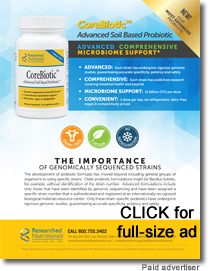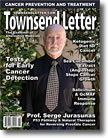|
Page 1, 2
There is a revolution going on among integrative cancer physicians. The dictate from the ancient Greek physician Hippocrates, "Let food by thy medicine and medicine be thy food," is gaining a whole lot of traction today in the form of the fat-centric ketogenic therapy.
Dr. Otto Warburg's work demonstrated that when a cell is deprived of 35 percent of its oxygen for 48 hours, the cell can turn cancerous. Why? Oxygen deprivation injures the energy factories inside each cell called mitochondria. An injured cell can survive, however, by reverting to the primitive way of creating energy called fermentation, which does not require oxygen. Think of fermentation as a back-up generator, something created billions of years ago when the earthdidn't have much oxygen and little life forms got along on this simple method. It's not as efficient for making energy, but today's defective cell is just trying to live. Its DNA becomes unstable, it forgets that it is supposed to die, and it starts reproducing uncontrollably. We call it cancer.
"The prime cause of cancer is the replacement of the respiration of oxygen in normal body cells by fermentation of sugar," Dr. Warburg said. He was awarded the 1931 Nobel Prize in Physiology or Medicine for discovering how cells obtain energy from fermentation.
 Cancer cells cannot ferment fats, but they can ferment sugar and they do that really well. Cancer cells produce extra glucose transporters to enable more sugar to enter their cell membranes. The fermentation process turns glucose and the amino acid glutamine into sufficient quantities of energy – not enough to do the big jobs required of normal cells like pumping blood and giving us vision, but enough to squeak by and survive and grow. Cancer cells cannot ferment fats, but they can ferment sugar and they do that really well. Cancer cells produce extra glucose transporters to enable more sugar to enter their cell membranes. The fermentation process turns glucose and the amino acid glutamine into sufficient quantities of energy – not enough to do the big jobs required of normal cells like pumping blood and giving us vision, but enough to squeak by and survive and grow.
Although Dr. Warburg was con-sidered perhaps the greatest biochemist of the 20th century, his discoveries faded from view as later researchers became enthralled with the mysteries of genetics. Even so, a small thread of his work found a foothold in mainstream medicine; a positron emission tomography (PET) scan looks for cancer by combining a radioactive tracer with glucose. Cancer cells take up the sugar in bigger proportion than healthy cells and – voila – we end up with an image of a tumor. PET scans are used routinely to diagnose and stage cancer.
So, what if we starve the cancer cells of their sugary fuel? What if we switch the fuel we put in the body to something cancer cells cannot use? Enter the ketogenic approach.
"Dr. Thomas Seyfried is why things have changed, why we are using the ketogenic method now," said Dr. Robert Eslinger of Nevada. "He's the guy who said we need to look again at Warburg and pay attention to this. And Seyfried is producing the studies to prove it."
Dr. Seyfried has taught and conducted research in the fields of neurogenetics, neurochemistry, and cancer for more than 25 years at Yale University and Boston College. He unleashed an eye-opening book in 2012 entitled, Cancer as a Metabolic Disease: On the Origin, Management, and Prevention of Cancer. He said cancer is a mitochondrial metabolic disease, and diseased mitochondria become dependent on glucose and glutamine for fuel. Thus, cancer requires metabolic solutions for its management and prevention. He is saying that au contraire to establishment thinking, cancer is not a disease caused by bad genes.
"The study that tipped me over was his glioblastoma study with the mice,"1 said Dr. Eslinger, who presented on "Ketogenic Potentiated Therapy" at the annual International Organization of Integrative Cancer Physicians (IOICP) conference in April 2017, in San Diego. He was mobbed by other attendees after his lecture for more detail.
"I have a couple hundred patients using the ketogenic approach in the last couple of years," he said. "I see significant improvement in response to treatment. I want patients to be able to get into ketosis before we start the therapies because it enhances all the therapies."
The ketogenic approach is designed to be the closest thing to a sugar-free diet we can eat. When our blood glucose is low, insulin's opposite hormone, glucagon, kicks in. Glucagon stimulates fat burning and that puts ketones – the breakdown of fats – into the bloodstream. Cancer cells cannot use ketones for fuel so when ketones are just about the only thing in the pipeline, cancer cells are stressed. As a bonus, fewer free radicals are made. And it's anti-inflammatory.
The ketogenic strategy is designed to turn you from a sugar burner into a fat burner. If you are "in ketosis," you are burning fat, ketones. What patients eat is very low on carbohydrates, low on protein, and high in fats like nuts and nut butters, avocados, olives, fish (especially those high in omega-3 fatty acids like halibut, herring, mackerel, orange roughy, sardines), eggs, poultry, game, and some dairy. Oils used in the diet are coconut, MCT, and olive. Other cooking fats include avocado oil, butter, lard, tallow, duck fat, and goose fat. What's not on the list? None of the refined, adulterated, inflammatory seed oils like soy, corn, canola, safflower, sunflower, and cottonseed that have been so prevalent in American foods for the last 60 years.
"The only friendly form of carb," said Dr. Sean Devlin, "is a low glycemic carb such as broccoli, kale, asparagus, artichoke hearts, bell peppers, cabbage, Brussels sprouts, cauliflower, cucumber, celery, eggplant, onions, radishes, snow peas, spinach, turnips, watercress, zucchini, and dark leafy greens. None of the starchy stuff like potatoes and pasta." Dr. Devlin is the Medical Director for the Best Answer for Cancer Foundation, which hosts the annual IOICP conference.
Those starchy carbs are the biggest struggle for most people because Americans typically eat a substantial amount of carbohydrates. Starchy carbs turn into sugar in the body, and sugar has an addictive quality to it. Some experts believe sugar is several times more addictive than cocaine.
To be in a state of ketosis, people are eating about 80 percent fat for fuel, and a 20 percent mix of carbs and proteins. For a 150 pound cancer patient, Dr. Eslinger would design a daily food intake of 120 grams of fat, 75 grams of protein, 12 grams of carbs. So fat is the main entrée, and carbs are reduced to a mere condiment. The standard American diet is pretty much the opposite – the carbohydrate intake is about 40-60 percent of calories. But to achieve a state of ketosis, carbs plummet to 2-4 percent of calories.
After two-to-three weeks, people report they are over the worst of the sugar cravings and find the fats very satisfying. Hunger goes away, and patients experience lower blood sugar and insulin levels. Their CRP level, a marker of inflammation, goes down. Their cholesterol levels get better.
Protein is also limited because once sugar is gone, cancer cells can access free amino acids from the breakdown of protein and use them as fuel.
Dr. Seyfried recommends that blood sugar levels be allowed to fall into the 55-65 mg/dL range, and that ketones rise to at least 4.0 mM.
Many physicians combine the ketogenic approach with intermittent fasting. That can mean not eating anything between last night's dinner and today's lunch or even today's dinner. Or fasting for several days at a time. "That alone has shown a lot of efficacy," said Dr. Nasha Winters of Colorado. "Too much protein or too little fat will keep you hungry. I feel it when I am out of ketosis. I get headaches, fatigue, and my brain is not firing at all cylinders. Some of my patients are amazed at how clear their thoughts are when they follow the diet."
The initial protocol used by integrative cancer physicians often makes use of a blood ketone meter, a combination of bio-active silver hydrosol and aloe vera to cleanse the gut, targeted supplements, digestive enzymes, and depending upon the patient, a liver flush.
Dr. Thomas Seyfried believes that a breast cancer is no different than a cancer of the liver, or lung, or any other part of the body because all cancer cells, regardless of where they come from, have the same disease of energy metabolism. "They all ferment glucose and glutamine; they all have the same fuel driving these tumors," he said. "Ketosis works because it targets several key hallmarks of cancer. First, it is antiangiogenic (it shrivels blood vessels in the tumor). Second, it is powerfully anti-inflammatory (systemic inflammation can cause cancer or sustain its progression). Third, it is pro-apoptotic (increases tumor cell death). It is a very simple, elegant, and non-toxic checkmate on tumor cells. And when you remove glucose and glutamine, the cells are very sensitive to hyperbaric oxygen therapy, which eliminates the need for radiation. So, quality of life during treatment is much higher."
And what of the new immunotherapy drugs making headlines? Dr. Seyfried doesn't think they will amount to much. "Immunotherapies are based on gene therapy and this is not a genetic disease. Genetic changes are a downstream effect of the metabolic dysfunction. Physicians have said to me, ‘If this is so important, I would have been told this in med school.' Are you kidding me? They would never be taught in medical school that food is medicine. As long as the American Medical Association, groups like Susan G. Komen, and major cancer centers keep calling it a genetic disease, the revenue streams keep flowing. Meanwhile, the bodies keep piling up; 1,600 people a day in the United States die of cancer. Patients are very receptive to metabolic therapy, but they get discouraged when their oncologist – who does not understand the biology of the disease – rolls his eyes and tells them that being in a fat-burning state of ketosis won't work. The standard of care is based on a false impression of what the disease is, but we just can't keep brutalizing cancer patients like this. Patients need to demand better."
Since food gets little respect and no grant money from the establishment pursuing gene therapies, there have been no large trials of the ketogenic therapy. But the evidence is mounting up, patient by patient, study by study. Seyfried says several peer-reviewed studies have been done; and as more physicians see the light, there are more and more former stage IV cancer patients walking around alive and well.
The ketogenic therapy is an emerging area, and there will be refinements and modifications as we learn more. As Dr. Devlin put it, "Ketosis is the biggest, most inexpensive tool people have in cancer treatment."
Page 1, 2
|
![]()
![]()
![]()
![]()





